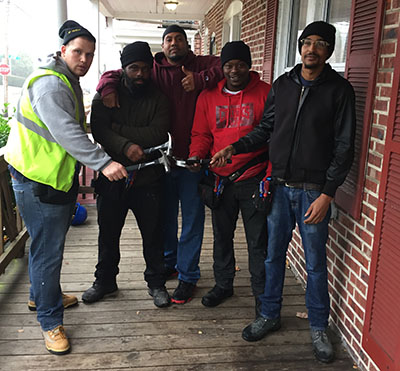Image

When Omar Faust, housing development manager for Interfaith Community Housing of Delaware (ICHDE), was working to redevelop 12 condos for artists in Wilmington's creative district, he saw the same group of men hanging around every day with nothing else to do. All were ex-offenders, and no one wanted to take a chance on them.
"If we are to change the direction of their lives, we have to restore hope and change the mindset of the community," says Faust. For him, that means creating the opportunity for these individuals to work in ICHDE projects.
"Many had been locked up at a young age, more than once. Rather than being in school and strengthening their job skills, the experience strengthened the characteristics that got them in jail in the first place," says Faust. "I want to show them another way."
Faust started by offering small jobs in demolition and mentoring the workers to help them develop coping skills for personal and family issues. He also organized a job fair and 62 people showed up. "When you face the kinds of challenges these people face, the commitment level is higher," he observes.
In partnership with its chosen contractors, ICHDE was able to provide on-the-job training to five residents of the West Center City community in 2015.
Then, in July 2016, ICHDE was awarded a Strategic Workforce Training Grant by the Delaware Department of Labor, and hired a seasoned workforce development professional, Danielle Brothers, to develop and pilot a formal, four-month HomeWorks Construction Employment and Training Program.
 The program launched in September, combining education with paid on-the-job training. Using curriculum from the Home Builder's Institute (HBI), participants start with three weeks of classroom training, followed by a combination of classes and on-the-job-training at ICHDE construction sites. By week 11, they are on the job site 30 hours a week and have earned a valuable HBI certificate.
The program launched in September, combining education with paid on-the-job training. Using curriculum from the Home Builder's Institute (HBI), participants start with three weeks of classroom training, followed by a combination of classes and on-the-job-training at ICHDE construction sites. By week 11, they are on the job site 30 hours a week and have earned a valuable HBI certificate.After the formal program concludes, contractors have the option of hiring the trainees. Of the initial group of 10, four successfully completed the first round. It isn't an easy road back into society after incarceration, and trainees are expected to perform.
"We only have them with us until 4 p.m. each day, and a lot can happen after then, but we still have jobs to do and I cannot tolerate nonsense," explains Faust.
Since coming to ICHDE, Brothers has worked to offer other life-skills support for participants, broaden the network of resources and referral sources, and assure that all Department of Labor standards are met.
More than 80 people applied for second round of the program in November 2016. So many of the applicants interviewed well, demonstrating the drive and determination needed to succeed, that the final group of 15 was selected by lottery. It includes two women.
"I have never been so excited about being able to get rid of the criminal background in my life," said one.
Trainees all must live within three miles of an ICHDE worksite, thus further strengthening the community.
"You can feel the change in the neighborhood. People know us," says Faust.

